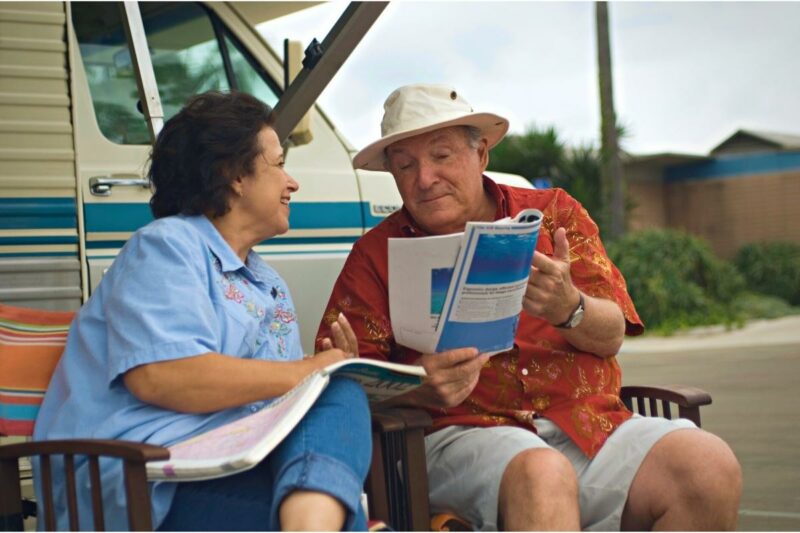Table of Contents Show
One of the more significant obstacles to full-time RVing is finding health insurance that works wherever you travel. Healthcare is a need that you likely can’t live without.
Someone in your family may have health concerns or chronic issues that require ongoing care. Maybe you don’t like the idea of not having appropriate health insurance for unexpected medical expenses that come up on the road.
We’re going to help you put an end to that stress. We’ve put together a guide to cover options for health insurance for full-time RVers. We’ll also show you how we found the best healthcare insurance policy for our full-time traveling needs.
Let’s get started!
Health Insurance Options for Full-Time RVers
You have many options regarding health insurance for full-time RVers. It’s essential to think about your specific needs when choosing health insurance.
What is your current health situation? What about your health history? How about the others in your household? Once you figure this out, you can consider which coverage best meets your needs.
Some insurance plans on this list have minimum essential coverage while others don’t. Health insurance plans with minimum essential coverage offer coverage that the government has deemed necessary in a health insurance policy. This includes ten categories of benefits, like outpatient care, emergency care, maternity, and newborn care, and mental health services.
Is it necessary to have this comprehensive coverage, or do you only want health insurance that covers unexpected healthcare on the road?
Let’s go over the various insurance types.

Medicare
Medicare is a national health insurance program available to those 65 years old or older. It’s also a program that covers younger people who’ve received Social Security Disability benefits for at least two years, plus a couple of other categories of people.
There are several parts to Medicare. Because of this, it’s best to work with a knowledgeable Medicare representative to help you pick the best option for your needs. The Senior Health Insurance Information Program (SHIIP) has trained volunteers that offer benefits counseling to anyone eligible for Medicare, free of charge.
Medicare insurance works nationwide. You can have your primary care team in your hometown for annual appointments. You’re also free to travel with peace of mind that you can see any doctor, anywhere, no matter your zip code. This can make it an appealing healthcare plan for full-time RVers. Medicare meets the minimum essential coverage guidelines we discussed earlier.
ACA Health Insurance
The Affordable Care Act (ACA) is a healthcare reform law passed in March 2010. This required individuals to have a qualified health plan that met minimum essential coverage guidelines.
The ACA was a big step forward for people with significant health needs and pre-existing conditions. They no longer had to fear that they’d get kicked off their health insurance plan by maxing out the yearly dollar allotment or lifetime maximum. They no longer worried that they would be denied care due to a pre-existing health condition. ACA plans cover any adult, no matter their health condition.
You apply for an ACA plan through the ACA Marketplace, healthcare.gov, or through their partner, healthsherpa.com. Prices vary by your household income and your home zip code. The federal government offers tax subsidies that you can apply to your monthly insurance premiums to reduce your expenses.
Because of this, you must report your accurate income. If your income goes up or down, be sure to report those changes too. If you don’t, you’ll pay for it come tax time by potentially repaying for the premium assistance difference at that time.
ACA plans are a good option if you aren’t old enough to qualify for Medicare. When shopping for a plan through the ACA Marketplace, pay attention to the benefits to see if it covers any care out of state.
Many of these plans only provide care for the state they’re issued in, except for emergency coverage. Others may cover urgent care visits out of state or other healthcare appointments out of state. If you’re traveling out of state often and are looking for healthcare as a full-time RVer, this is a crucial thing to consider.
Pro Tip: In addition to health insurance, the Good Sam Travel Assist policy can help with medical emergencies.
Private Health Insurance
Private health insurance is an insurance plan you obtain on your own or through a workplace. If your workplace offers health insurance, chances are it’s a private health insurance policy.
You can also purchase a private health plan from an insurance agent, depending on the state you domicile in. These may or may not meet minimum essential guidelines, so know that they may not cover all healthcare.
Be sure to pay attention to what type of policy it is. The best is a preferred provider organization, or PPO, policy. This means you’ll have a nationwide network of providers. These are often the highest-cost policies.
Your private health insurance policy may work on a much smaller network, like an exclusive provider organization (EPO) or health maintenance organization (HMO) network. If so, your insurance plan only covers your care costs when you see someone from within that network.
If you’re looking for healthcare insurance as a full-time RVer and travel the country extensively, know that your care will likely only be covered out of the area if it’s a medical emergency.
Short-Term Health Insurance
Short-term health insurance can be an excellent option to get coverage that works throughout a nationwide network. These plans are valid on a short-term basis for three, six, nine, or even 12 months or more.
Typically, people get these plans during a transition, serving as insurance while one coverage ends and another begins. This is helpful when changing jobs, as well.
Many also use these plans as their long-term healthcare and renew them once they end. There are risks with continually renewing these policies, though. You’ll have to undergo a recertification process each time, and the insurance company doesn’t have to renew your policy.
There are likely limits on how much your plan covers each year and throughout your lifetime. If you have significant healthcare needs, you run the risk of maxing them out. These policies don’t typically cover pre-existing conditions right away. They also do not meet minimum essential coverage guidelines.
If you have a history of medical issues, or if you’re concerned that you’ll have a hard time passing the recertification, these may not be for you. If you’re otherwise healthy and want an affordable plan that works nationwide mainly for unexpected incidents, these could be suitable options

Fixed-Benefit Insurance
With fixed-benefit insurance, your insurance pays out a fixed amount of money for each healthcare service. For example, if you have an annual check-up, go to the emergency room, or get a procedure, you would receive a predetermined fixed amount.
These plans can work on a nationwide network, so you get in-network discounts for care and have the flexibility to shop around for the provider with the best rate.
For these plans, you often have to pass underwriting, and they may not cover pre-existing conditions. Plans like these do not meet minimum essential coverage.
Still, they can be helpful if you want help paying for health expenses no matter where the road takes you. If you have a health insurance policy that doesn’t work nationwide, a fixed-benefit policy could also be a great supplement to your insurance coverage, helping to offset out-of-network costs.
Telemedicine
Telemedicine is virtual outpatient healthcare. You log in and meet with a medical provider from your smart device. This isn’t a substitute for an actual medical insurance plan since it doesn’t cover things like hospitalizations, procedures, or emergency care. It gives you a way of getting medical advice and a prescription if needed.
This is helpful healthcare insurance for full-time RVers because as long as you have an internet signal, you can see a provider. You may choose to call in and meet virtually with your primary care provider while on the road, or you can meet with a new doctor. The choice is yours.
Many companies offer monthly telemedicine plans for a small premium, or you can pay out of pocket each time you use the service. Many traditional insurance plans also cover virtual health visits, some at no cost to you.
Healthcare Sharing Ministry Plans
Healthcare sharing ministry plans are different than traditional health insurance plans. You still pay monthly premiums, but instead of paying to an insurance company, you pay to the health share organization, where it goes toward helping another’s medical expenses. When you have a medical need, you pay a portion of the bill – like a deductible – and other plan members’ payments go toward paying your medical expense.
These organizations are typically religious-focused, although there are secular healthcare sharing plans, too. This does not meet minimum essential coverage and may not cover all types of care. There’s typically a waiting period for them to cover any pre-existing conditions.

Self-Employed Health Insurance
Are you one of the many full-time RVers who are self-employed? It’s often this freedom that allows you to be on the road in the first place. Being self-employed brings with it a responsibility to get your insurance coverage.
Several insurance options we’ve already talked about could work for you if you’re self-employed, like a private, ACA, or short-term policy. Depending on your field of work, you may be able to purchase your health insurance policy through an association group that gives you discounted group rates.
If you’re self-employed and have few employees, you can purchase a health insurance plan for your employees. You can get a private policy through an insurance broker, or you can look on the ACA Marketplace for a Small Business Health Options Program (SHOP) plan.
If you purchase through the ACA Marketplace, you can then apply for the Small Business Health Care Tax Credit, which could help offset your costs for your employees’ health insurance.
Finally, if you’re self-employed, you can deduct up to 100 percent of the healthcare premiums you’ve paid. This lowers your adjusted gross income (AGI). Now that’s significant savings come tax time.
How We Found the Best Health Insurance As Full-Time RVers
Finding health insurance for full-time RVers can be a complicated process. Even the most healthcare-literate person may have a hard time wrapping their mind around all the nuisances of health insurance.
We found a solution to help with that!
What Is the RVer Insurance Exchange?
We used the RVer Insurance Exchange to get paired with a knowledgeable representative to walk us through healthcare options for full-time RVers.
The RVer Insurance Exchange insurance professionals know about the nuances of health insurance. And they also know about the full-time RVing lifestyle as many of them are full-time RVers themselves.
You don’t have to go at it alone, and here’s why we didn’t.
Pro Tip: After traveling full-time for over four years, we have some tricks to make RV living easier.
Why We Chose Our Plan Through the RVer Insurance Exchange
Originally the plan was to get the cheapest health insurance. Jason and I figured we were young and wouldn’t face any health issues. Unfortunately, six months before hitting the road, I had a medical issue pop up.
I was having a hard time getting a diagnosis but didn’t want to postpone our RVing adventures. Because of this, I knew I would need decent health insurance on the road. That’s when we found RVer Insurance Exchange and paired with a knowledgeable representative, Portia LaVigne.
Paired With a Knowledgeable Representative
Getting paired with Portia was easy. We filled out the RVer Insurance Exchange form and received a call back quickly. The call was simple and only took about 15 minutes. I answered basic questions about what we were looking for in an insurance plan and what we wanted to spend.
Portia then emailed us a few documents that needed to be submitted to determine our qualifications. After filling those out, we waited about a week and scheduled a Zoom call with Portia.
Broke Down the Plans in an Easy to Understand Format
During our Zoom call with Portia, she broke down the different health insurance plans. The presentation reviewed what each program covered, its cost, and where we could use it throughout the United States.
No Pressure Sales
Choosing the right health insurance plan was a big decision for us, so it was nice not to feel pressured to make a decision quickly. Jason and I reviewed the presentation after the call and discussed which options we liked. We always sleep on decisions like this, and Portia allowed us to take the time we needed before getting back to her.
Affordable Plans
Because of my undiagnosed medical issues, Jason and I opted for the plan with the most coverage. We opted for a PPO Nationwide Plan to choose my doctors without awaiting any referral.
We found a reasonably priced plan; it was under what we expected to pay. We loved knowing that there were more affordable plans out there if we ever wanted to change plans in the future. We even saved a bit by selecting a basic yet affordable dental and eye plan.

What Type of Health Plans Does the RVer Insurance Exchange Offer?
The RVer Insurance Exchange offers a variety of health plans. You’ll have access to Medicare supplements, telemedicine plans, fixed-benefit plans, short-term plans, and more. They’re even ACA-certified and can help you choose an Affordable Care Act plan.
They’ll likely know what you’re talking about when you use phrases like “domicile,” “full time,” or “digital nomad,” and you’ll have what you need to get over the health insurance hurdles you’re facing.
Get Your Free Quote Today
Shopping for health insurance is daunting. You need to consider your specific healthcare needs and what you’re looking for in a health plan. Why not have a trained representative guide you through the process? Contact the RVer Insurance Exchange today to find what makes sense for your specific situation.
We found the best health insurance for full-time RVers. We’re hoping it will help you, too.
What do you use for health insurance while full-time RVing?







The agents at RVer insurance exchange are going to try to pigeon hole you into one private option plan. This plan has no out of pocket maximum. There are more insurance agents out there who will find you better plans. Like plans that travel with you state to state WITH out of pocket maximums. Before committing to a plan make sure you ask your agents, what is my out of pocket maximum?